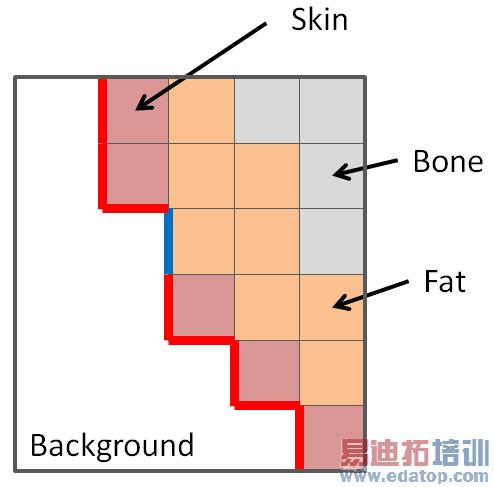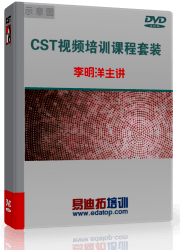- 易迪拓培训,专注于微波、射频、天线设计工程师的培养
CST2013: Material Parameters: default - Thermal
Modeling: Materials New/Edit
New/Edit New Material
New Material Thermal
Thermal
Edit Object Properties (navigation tree: Materials:material1
(navigation tree: Materials:material1 Properties
Properties Thermal)
Thermal)
This is a dialog page of the Material Parameters dialog box.
This dialog offers the possibility to define thermal properties of a material.
Thermal properties are independent of the chosen problem type. Their values will be the same for all defined material sets.
Type
Three different types of thermal materials are available:
PTC | Perfect Thermal Conductor - this is the thermal equivalent to PEC. Temperature- and Heat-sources can be assigned to PTC material surfaces. |
Normal | Isotropic material with a homogeneous material distribution |
Anisotropic | Anisotropic material with a homogeneous material distribution |
Material density info
This field is for information purpose only, since it is important for transient thermal calculations.
General
In this frame, general thermal material properties are defined.
Thermal conductivity
Enter the thermal conductivity of a material here. If a zero conductivity is specified the material is not taken into account for a thermal simulation.
Heat capacity
This field allows to enter the specific heat capacity in [kJ / (K kg)]. This setting is relevant only for transient thermal simulations.
Nonlinear:
Shows up the Nonlinear Thermal Material Properties dialog. In this dialog, the dependencies of thermal conductivity as well as specific heat capacity on temperature can be defined. The default values of corresponding thermal properties must be non-zero, otherwise an error message will be shown.
Thermal diffusivity
The thermal diffusivity value is shown for information purpose only. It is calculated from the conductivity, the heat capacity and the density of a material.
a = k / (rho * cp * 1000)
With:
a: Diffusivity [m2 / s]
k: Thermal conductivity [W / K /m]
rho: Density [kg / m3]
cp: Specific heat capacity [kJ / K / kg
Materials with high thermal diffusivity react rapidly to the temperature to of their surroundings, because they conduct heat quickly in comparison to their volumetric heat capacity. If materials with very high diffusivities are used for the transient thermal simulation, the computation time might rise, because the a high diffusivity value lowers the time step of the simulation scheme.
Bioheat properties
Bloodflow coefficient
The Bloodflow coefficient is a parameter of the bioheat equation. It determines the influence of blood at a certain temperature inside the tissue volume V. The reference temperature for the bloodflow (usually: 37 C) can be defined in the thermal solver specials dialog boxes of the stationary- and the transient solver.
Basal metabolic rate
The Basal metabolic is a parameter of the bioheat equation. It describes the amount of heat which is produced by tissue per volume V.
Convection transfer coefficient
This parameter allows to consider convection processes on voxel models. Typically this parameter is used with a material describing skin. For coarse voxel models it is advisable to use fat in addition. Only voxel-surfaces which are between the voxel material and the background material are taken into account.

This picture shows which voxel-surfaces are used for the convection model. The red lines mark the surfaces on skin-voxels, while the blue line marks a surface on a fat-voxel.
CST微波工作室培训课程套装,专家讲解,视频教学,帮助您快速学习掌握CST设计应用
上一篇:CST2013: Export Plot Data (ASCII)
下一篇:CST2013: Field Import
 最全面、最专业的CST微波工作室视频培训课程,可以帮助您从零开始,全面系统学习CST的设计应用【More..】
最全面、最专业的CST微波工作室视频培训课程,可以帮助您从零开始,全面系统学习CST的设计应用【More..】
频道总排行
- CST2013: Mesh Problem Handling
- CST2013: Field Source Overview
- CST2013: Discrete Port Overview
- CST2013: Sources and Boundary C
- CST2013: Multipin Port Overview
- CST2013: Farfield Overview
- CST2013: Waveguide Port
- CST2013: Frequency Domain Solver
- CST2013: Import ODB++ Files
- CST2013: Settings for Floquet B
